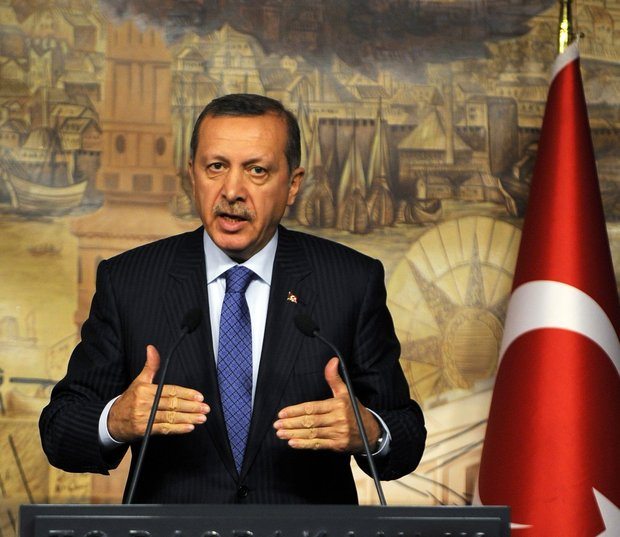While Prime Minister Tayyip Erdogan has been using his anti-Israeli rhetoric to build up Turkey as a new great power in the Arab world, his neo-Ottoman policy is sparking a reaction among other countries that could pose for him serious problems in the period ahead. For Erdogan has not only been using aggressive rhetoric against Israel. In the last few weeks the Turkish government has also been threatening Cyprus for developing its undersea gas resources in the Mediterranean. As a result, Russia has been drawn in to neutralize Turkish behaviour.
Cyprus just signed an agreement with the Texas-based Noble Energy, which is in a partner in developing Israeli maritime gas fields, as well. Turkey’s Minister for EU Affairs, Egemen Bağış let it be known that the Turkish Navy could intervene if Greek Cyprus does not call off the project. He said “That’s what a navy is for.” As a result, the Russian Foreign Ministry publicly backed the right of Cyprus to develop its Mediterranean gas. Cyprus, in turn, described Russia as “a shield against any threats by Turkey.”
Last Friday, the famous Russian daily, Pravda, published an article entitled “Turkey Wants to Revive the Ottoman Empire.” The article reviewed the way Turkey has been building its influence in the last few years with the Muslims of Bosnia, which is a sensitive point for Moscow, the traditional ally of the Serbs. The article also warned that Turkey was undergoing a process of “gathering strength” in order to claim territories that it lost with the breakup of the Ottoman Empire. It predicted greater Turkish activity in the Caucuses and in Crimea, “which cannot but worry Russia.”
Turkish policy in the Balkans has also raised eyebrows among a number of states in recent years, During a visit to Sarajevo in 2001 Turkish Foreign Minister Ahmet Davutoglu declared “The Ottoman centuries of the Balkans were success stories. Now we have to reinvent this.” He also has spoken about the Balkans, the Caucuses, and the Middle East as Turkish spheres of influence, which were better off under the Ottoman Empire than they are today. The Caucuses are of course part of Russia, which puts this new Turkish policy into a potentially direct clash with Moscow in the future.
Where does this Russian concern with the revival of Turkish power come from? Are there special links between Russia and Cyprus that cause Moscow to act as its defender? Looking back with some historical perspective, many have forgotten that Russia was at war with the Ottoman Empire for centuries. In 1774, the Russians seized Muslim populated territories from the Ottoman Empire for the first time when they took control of Crimea and signed a peace treaty at Küçük Kaynarca in which Russia claimed to be the protector of all Greek Orthodox Christians–including those in Greece and Cyprus.
By World War I, the Russian Army invaded what is today Eastern Turkey; while after World War II, Russia claimed the Turkish Straits into the Mediterranean, and was held back by the US at the beginning of the Cold War. In short, Russia and Turkey are old rivals. What Erdogan and his ministers have succeeded in accomplishing is to awaken a sleeping Russian bear by reviving Moscow’s historical concerns with with an atavistic Turkey with ambitions to restore its old areas of influence.
Looking at the Middle East from Moscow’s vantage point, a Turkey with an Islamist foreign policy poses a greater problem for Russia than Iran. Across much of Russia, most of the peoples living there speak dialects of the Turkish language. Because they are Sunni Muslims, they are more open to Sunni organizations based in Turkey than to Shiite groups operating on behalf of Iran. Secular Turkey fought against Islamist groups; yet Erdogan’s Turkey supports them, including organizations like the IHH, which was responsible for the violence on the lead ship in the 2010 Gaza Flotilla, the Mavi Marmara. According to a July 2010 report in the New York Times, many board members of the IHH have been officials in Erdogan’s ruling AKP Party.
The Russians probably noticed that one of the IHH operatives on the Marmara, Erdinç Tekir, participated in a 1996 terrorist attack on a Russian ferry in the Black Sea, whose purpose was to obtain the release of Chechen terrorists from a Russian prison. Indeed the founders of the IHH served as volunteers in the Mujahideen Brigade that fought the Russians’ Serbian allies during the Bosnian War. Previous Turkish governments seized IHH documents which showed that its members were going to fight in Afghanistan, Bosnia, and Chechnya. The IHH leader, Bulent Yildirim, gave a speech in October 2010, attacking Russia, as well as other major powers for killing Muslims.
Russia is not about to go to war with Turkey. And Israel still prefers that its old relations with Turkey can be restored in the future. But at the same time Israel should be aware of the fact it is not the only state having problems with Turkey lately. Erdogan and his foreign minister are visiting former Ottoman territories and rather than acting according the the subtle rules of diplomacy that an ambitious state should follow, Turkey comes off like a “bull in a china shop” after many of these visits. Last week, Ankara threatened the European Union if it gives Cyprus the rotating presidency of the EU in 2012. The lesson is that the international politics of the Middle East are dramatically changing, and Israel will have to carefully monitor who is allied with whom in the Eastern Mediterranean in the years ahead.
This article originally appeared in Israel Hayom


Leave a Reply